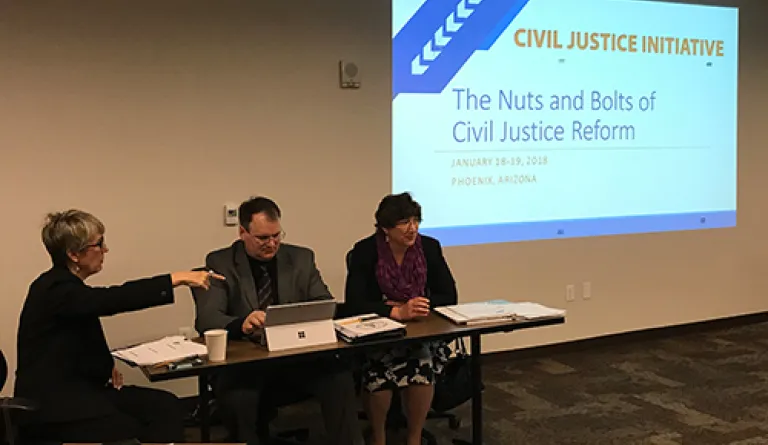Workshops Bring Oxygen and Sunshine to Civil Justice Reforms

IAALS, in partnership with the National Center for State Courts (NCSC), continued its leadership on implementing Civil Justice Initiative reforms at a workshop held in Phoenix, Arizona, January 18-19. The program, The Nuts and Bolts of Civil Justice Reform, was co-sponsored by the NCSC and the Maricopa County Superior Court.
Approximately 20 judges and court administrators participated, from Hawaii to Tennessee. The workshop was led by Paula Hannaford-Agor of NCSC; Brittany Kauffman of IAALS; Judge Derek Pullan from Utah; Dan Wallis, trial court administrator from McHenry County; and myself.
The workshop focused on developing hands-on civil justice reform projects for the jurisdictions in attendance, including ideas to improve processes for uncontested or minimally contested cases, encouraging judges to engage in case management and defining what that task encompasses, looking at discovery and proportionality, and leadership in initiating local change.
Participants explored ways to triage cases on entry into the system and how to capture cases at risk for losing momentum. The role of technology, organizational culture, and the need for communication were the topics of specific discussion and debate.
The central theme from the Civil Justice Improvement Committee’s recommendations, as adopted in 2016 by the Conference of Chief Justices and the Conference of State Court Administrators, provided the structure for the workshop: courts have to take responsibility for managing civil cases from filing to disposition, and in doing so, match the right level of resources to the needs of the case. Many courts feel overwhelmed by complex cases when they are only a small fraction of the caseload but are demanding as to time. Other simpler cases get shoved to the side in the fight for judicial attention. Case management as envisioned by these reforms gives each case the oxygen and sunshine it needs to get to fruition.
Trial Court Administrator Wallis and I spoke about the demonstration pilot projects going on in our respective jurisdictions, which take the recommendations and put them into place on the ground. The Miami project has resulted in a 16% reduction in pending cases across 4,500 cases, with over 55% closed at 14 months compared with a control group of 17,000 cases which only achieved a 38% closed rate during the same time period. The Miami project has succeeded despite multiple (typical) setbacks such as staff resignations, hiring freezes, judicial elevations, and reassignments, and of course, Hurricane Irma.
Judge Pullan laid out the success of the Utah case management project, which provides for mandatory disclosures, case management conferences, case specific discovery schedules, and ongoing access to the judge. The workshop also discussed Utah’s three-tiered approach, which includes enumerated limits on discovery and proportionality as a bedrock principle. This approach has turned out to be practical and cost-effective for the parties with no loss of due process.
The workshop also identified the “easy stuff”: lack of prosecution, single notice to all parties, and service via email.
Overall, these workshops provide an opportunity to learn how the CJI reforms can be implemented as a practical matter in local courts. NCSC and IAALS are considering additional workshops in the future to help more people understand the nuts and bolts of implementing reform on the ground—and to give more people the tools to effect change.
